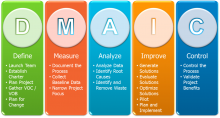RPI® is a systematic approach to problem-solving. It is a set of strategies, tools, methodologies, and training programs for improving our facility processes. The methodologies include: Lean, Six Sigma, and Formal Change Management. This is appealing to physicians and other clinicians because it is data driven.
This program was developed by The Joint Commission Center (TJC) for Transforming Healthcare to give organizations and their team members methodologies and tools to improve the quality and safety of health care. The ultimate goal is to transform our facilities into highly reliable organizations. Here is a scholarly article written by Mark R. Chassin and Jerod M. Loeb setting the stage for RPI® at TJC: High-Reliability Health Care: Getting There from Here.
By employing process improvement tools such as DMAIC (define, measure, analyze, improve, control) facilities use a systematic approach to solving complex problems. Specifically, they guide improvement teams to examine why processes fail to achieve their desired results.
Through this systematic search for validated causes of quality and safety problems and the assessment of the relative contribution of each cause that gives these improvement teams and tools a great deal of their effectiveness. Improvement teams are then able to pilot-test proposed solutions and measure their relative improvements to validate that the changes made a statistical difference.
Ultimately, facilities and teams that utilize RPI® and the DMAIC process develop a lasting and sustainable improvement for the facility. Important returns on investment (ROI) include: staff input and having an empowered voice, improved clinical operations and business processes.

